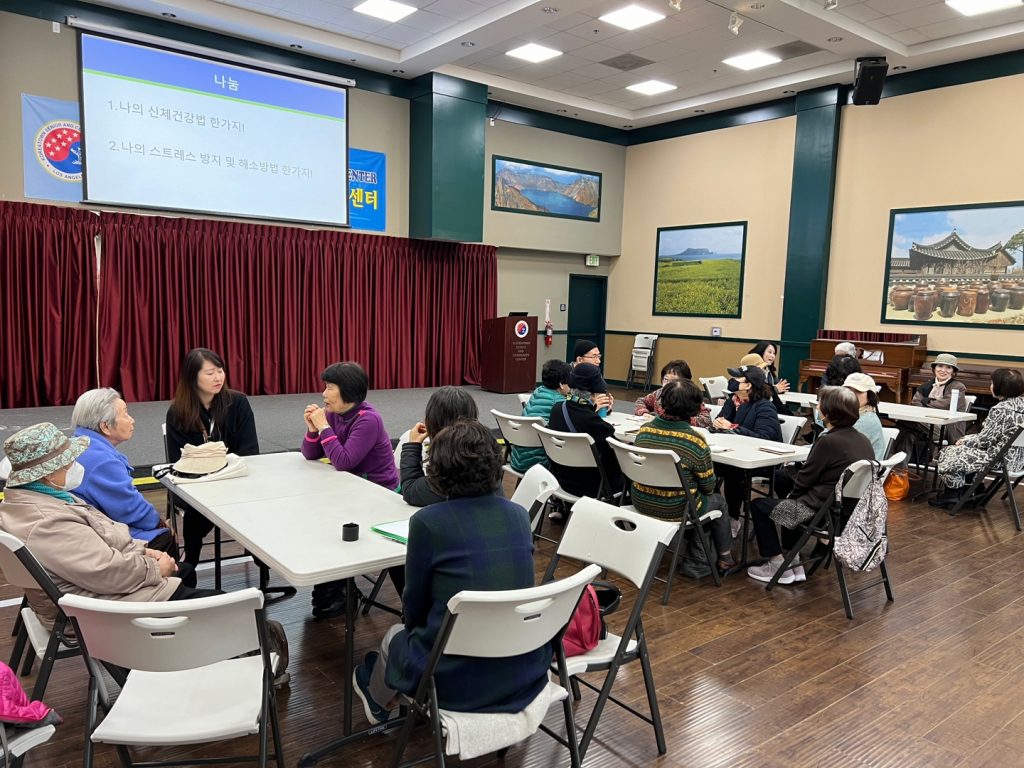“Let’s shout together, ‘I’m doing well, I’m doing well!'”
At 10 a.m. on February 8, around 20 Koreans assembled in the second-floor auditorium of the Koreatown Senior & Community Center in Los Angeles. Their voices were notably powerful during the gathering. Every Thursday morning, they share what’s on their minds in a Chat Room led by three Korean mental health promoters from the Los Angeles County Department of Mental Health.
For first-time attendees, the group’s name felt welcoming. “We don’t ask questions; we just talk about our worries and frustrations,” said Kyunghee Choi, 91. “During the pandemic, I was stuck at home, lost my memory, and felt depressed, almost like it was dementia. Since coming to the Chat Room since April last year, I’ve gotten better,” she laughed.
Sook Hee Hong (pseudonym, 60), who suffered from severe depression, shared, “I endured it alone, but eventually, my emotions exploded. I was scared of anger outbursts to the point where I wondered if my life was always this way,” adding, “I felt much better after expressing and expressing my pain little by little in the Chat Room.”

The Chat Room, initiated by the Koreatown Senior & Community Center and the LA County Department of Mental Health, aims to prevent and treat depression and provide mental health education and counseling to Koreans. Over the past year, promoters Namjin Choi, Danah Kim, and Younghwa Choi from the Department of Mental Health have been organizing events to raise awareness about the importance of mental health and help individuals discuss their concerns and find healing, guided by weekly themes.
On this day, the attendees divided into three teams and started talking. The topic was “How to prevent and relieve stress in your own way.” Participants were not asked their names, ages, where they live, or what they do. It was a “rule” to ensure anonymity and discourage comparisons among each other. When one or two people shared their problems, they were met with empathy. ‘I wasn’t the only one who was struggling,’ they said.
Jihee Kim (pseudonym, 50s) discussed her severe depression. “After my mom died, I didn’t want to do anything,” Kim said. “I stayed in bed for over a year, hated eating and even meeting people. I realized that I was in trouble, so I changed my mind and came to the meeting.”
“Soon Yi Kim (pseudonym, 79) shared, “I spent seven years alone in a three-story house. My ears gradually became deaf, and my eyesight worsened, so I avoided meeting people and going to meetings. I was anxious and depressed because I thought I wasn’t smart, but I kept it to myself. I then joined a counseling group because I wanted to live, and now I eat a lot of food no matter what.”
Since the pandemic, there has been an increase in Koreans reporting mental health issues such as depression. According to the KHEIR Clinic in LA’s Koreatown, mental health consultations increased to 2,786 in 2023, up 34% from 2,080 in the previous year and nearly doubled from 1,542 in 2019.
“Depression and anxiety overwhelmingly dominated the types of consultations from 2019 to 2023,” the clinic reported, “with 320 depressive disorders and 252 anxiety disorders accounting for 75% of the total 769 diagnoses made by medical staff.”
Mental health counseling at the Korean American Family Services (KFAM) also surged by 60% from the previous year to 367 cases in 2023. Depression accounted for 34% of the total, with 125 cases. The Koreatown Youth & Community Center (KYCC), which provides mental health counseling to low-income individuals under the age of 25, also reported that 34 percent of its patients suffered from depression last year.
The Los Angeles County Department of Mental Health (LACDMH) has called for active expression and counseling, noting that depression can lead to serious consequences, including suicide if left untreated. However, many Koreans are reluctant to disclose depression and other mental illnesses, which often exacerbates the situation.
“Koreans tend to keep their worries and depression to themselves,” said Younghwa Choi, a mental health promoter. “The health of themselves and their families should be prioritized more than their public image or the eyes of others. Depression is a cold of the heart, and if you treat it early enough, you can get better. There are various treatments available, so don’t be afraid to seek help,” she emphasized.
BY HYOUNGJAE KIM, JUNHAN PARK [kim.ian@koreadaily.com]




